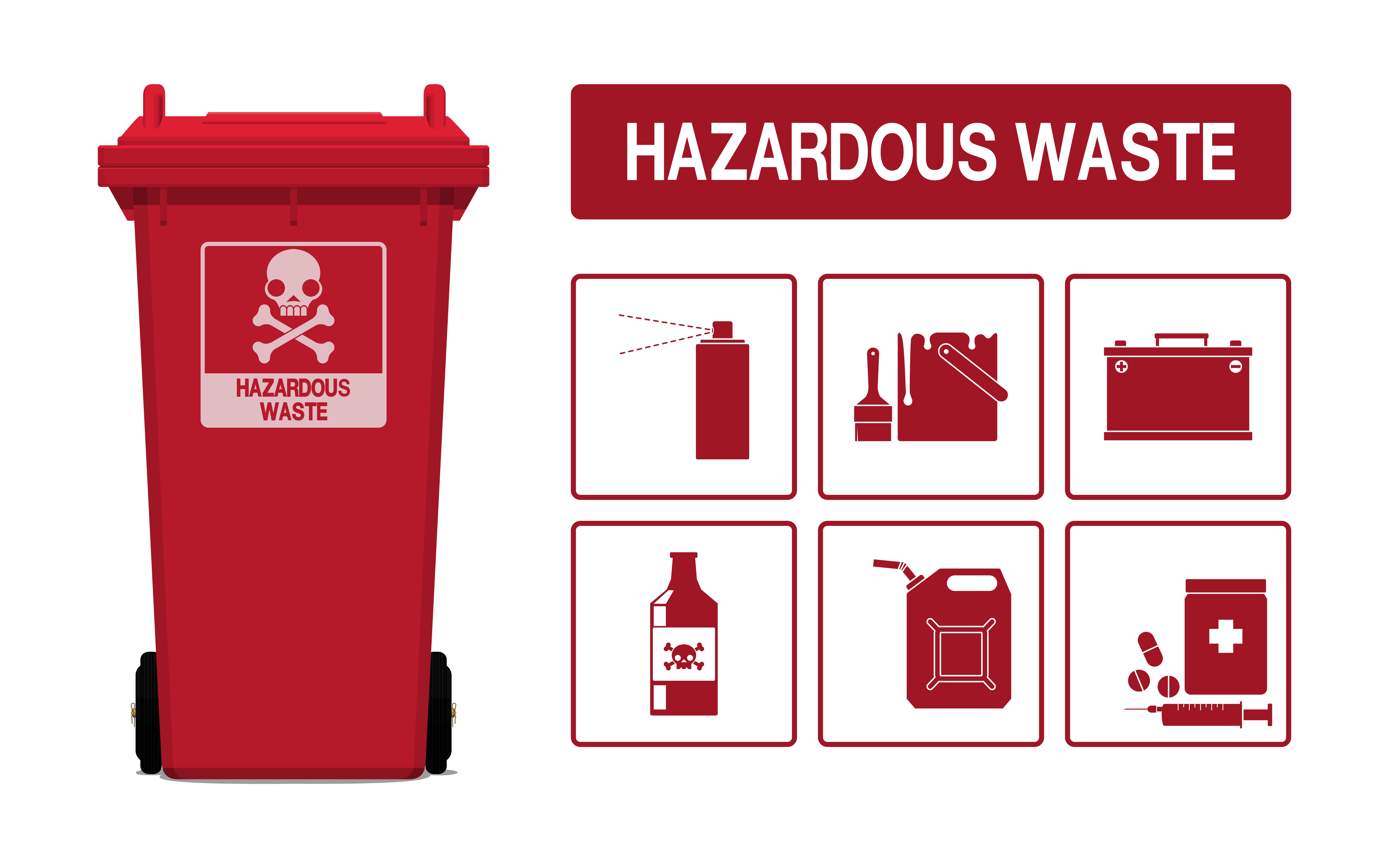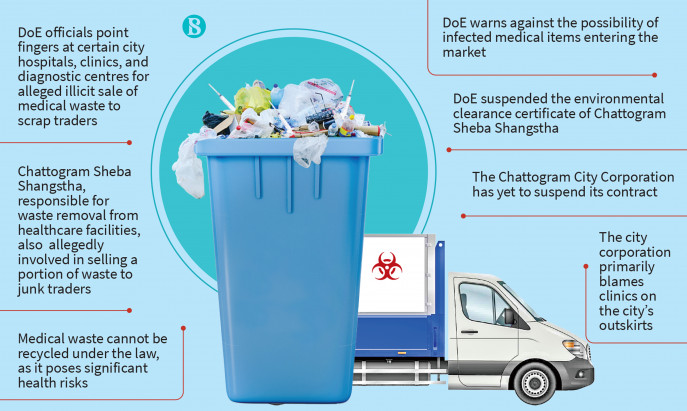Past Cleaning: Ensuring Safety And Security with Professional Medical Waste Removal
Wiki Article
Stay Ahead of Laws: Specialist Advice on Medical Waste Disposal
In a world where the healthcare market is regularly progressing, it is important for medical centers to remain ahead of regulations when it comes to the correct disposal of clinical waste. From understanding the various groups of medical waste to implementing the appropriate collection and partition methods, this discussion will supply important understandings and workable ideas to assist facilities remain in advance of policies in the ever-changing landscape of medical waste disposal.Recognizing Medical Waste Categories
Comprehending medical waste groups is important for appropriate disposal and management in health care centers. Medical waste describes any waste created by healthcare activities that might position a hazard to public health or the setting. It is essential to classify clinical waste precisely to guarantee its safe handling, disposal, transport, and treatment.There are several classifications of clinical waste that healthcare centers need to be aware of. One of the most usual categories consist of contagious waste, pathological waste, sharps waste, pharmaceutical waste, and chemical waste. Each group has specific guidelines and guidelines for its correct management and disposal.
Pathological waste refers to human cells, body organs, or body components that call for unique handling and disposal. Drug waste makes up run out, extra, or infected medications that need cautious handling and disposal.
Staying Up-To-Date With Regulatory Modifications
Remaining present with regulative changes is essential for healthcare facilities to make sure compliance and proper management of clinical garbage disposal. medical waste removal near me. With regulations frequently progressing, it is necessary for health care facilities to stay up-to-date to stay clear of charges, fines, and potential damage to the setting and public health and wellnessTo stay in advance of regulative modifications, healthcare facilities ought to establish a system for surveillance and tracking updates. This can be done by subscribing to regulative newsletters, going to seminars and workshops, and actively joining industry associations. Furthermore, centers should assign an employee or group responsible for staying notified and distributing details to pertinent stakeholders.
Routine interaction with governing agencies is likewise essential. Health care facilities should develop partnerships with local, state, and federal firms to ensure they understand any changes in policies that may impact their waste monitoring methods. This can be done via routine meetings, participation in public remark periods, and positive engagement with governing agencies.
Moreover, healthcare facilities need to take into consideration partnering with waste administration companies that concentrate on medical garbage disposal (medical waste disposal services with WasteX). These firms are frequently skilled in the most recent guidelines and can supply guidance and support to make certain compliance
Implementing Proper Collection and Segregation Methods
To effectively manage clinical waste disposal, health care centers need to establish appropriate collection and partition approaches in accordance with governing standards. Implementing these techniques makes certain the risk-free handling and disposal of potentially unsafe products, secures the setting, and decreases the risk of injuries and infections to healthcare workers and the public.
Correct collection and segregation approaches involve making use of designated containers and identifying systems. Healthcare facilities should give plainly identified containers for various kinds of medical waste, such as sharps, transmittable waste, pharmaceutical waste, and non-hazardous waste. These containers need to be color-coded and clearly marked to avoid confusion and advertise easy recognition.
In addition, healthcare facilities ought to educate their staff on the appropriate procedures for accumulating and setting apart medical waste. This includes informing them on the various sorts of waste, the suitable containers to utilize, and the relevance of complying with guidelines and laws. Normal training sessions and correspondence course need to be carried out to guarantee that staff members continue to be current on finest practices.
Furthermore, healthcare centers ought to develop a system for normal collection and disposal of clinical waste. This might involve partnering with accredited waste management business that specialize in clinical garbage disposal. These companies will make certain that the gathered waste is delivered and taken care of in conformity with regulative requirements.
Picking the Right Disposal Approaches

Incineration is just one of the most efficient and typical methods for getting rid of specific types of clinical waste, such as pathological waste and sharps. It entails the controlled combustion of waste at high temperature levels, reducing it to ash. Incineration can launch unsafe toxins right into the air and add to air pollution.

Various other disposal methods include chemical therapy, microwave therapy, and landfilling. Chemical therapy involves making use of chemicals to reduce the effects of the waste and disinfect. Microwave therapy utilizes microwave energy to warm and disinfect the waste. Landfilling includes burying the waste in a designated garbage dump location (medical waste disposal services with WasteX). Nevertheless, landfilling must be the last option because of the potential threat of contamination to soil and groundwater.
Making Certain Conformity Through Paperwork and Training
After thoroughly taking into consideration the ideal disposal methods for medical waste, medical care facilities have to make certain compliance with guidelines and reduce ecological impact by executing effective documentation and training treatments. This step is vital in keeping a lasting and risk-free environment for both healthcare employees their explanation and the public.
Training is similarly vital in guaranteeing conformity with regulations. Health care employees who deal with clinical waste needs to receive proper training on waste partition, dealing with, and disposal treatments. This training needs to cover subjects such as the proper use personal safety devices, recognition of various sorts of waste, and the correct disposal techniques for every waste group. By giving extensive training, medical care centers can encourage their team to make informed decisions and minimize the danger of inappropriate garbage disposal.
Verdict
Finally, staying ahead of regulations in clinical garbage disposal is critical for medical care centers. medical waste removal services. Recognizing the various classifications of medical waste, remaining upgraded with regulatory changes, implementing proper collection and partition methods, choosing the ideal disposal approaches, and making certain compliance with documentation Go Here and training are all essential actions. By complying with these guidelines, healthcare organizations can efficiently dispose and take care of of clinical waste in a accountable and safe fashionFrom comprehending the different groups of medical waste to implementing the ideal collection and segregation methods, this conversation will give useful insights and workable tips to assist facilities remain in advance of regulations in the ever-changing landscape of medical waste disposal. - medical waste disposal services with WasteX
The most typical groups consist of infectious waste, pathological waste, sharps waste, pharmaceutical waste, and chemical waste. Healthcare facilities must supply clearly labeled containers for various types of medical waste, such as sharps, infectious waste, pharmaceutical waste, and non-hazardous waste. Health care centers need to develop a comprehensive system to tape-record and track all elements of medical waste disposal, including kinds of waste generated, quantities, and disposal methods used. Healthcare workers who handle clinical waste needs to obtain ideal training on waste partition, taking care of, and disposal treatments.
Report this wiki page